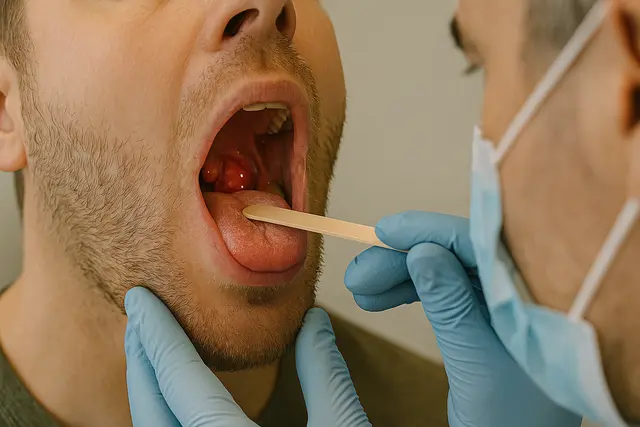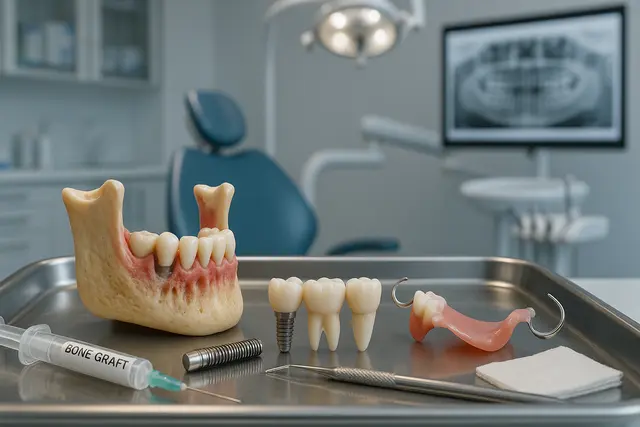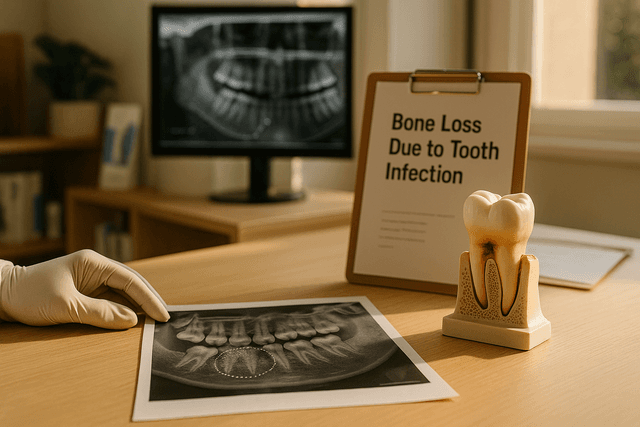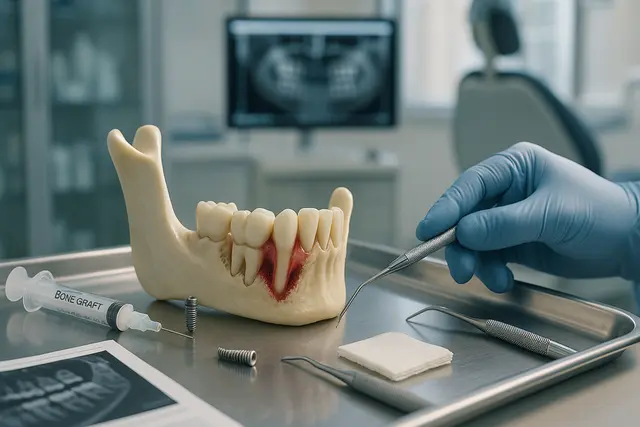Oral Health
5 min read
Jun 11, 2025
Do Dentists Check Tonsils — And Should You Ask Them To?
If you thought your dentist was just checking your teeth during every checkup, think again. From your gums to your tonsils and throat, there’s a lot more going on behind that little mirror. One surprising question patients often ask is: Do dentists check tonsils, and should you ask them to?

If you’ve ever left the dentist’s chair wondering what exactly the dentist was doing at every twist and turn, you’re not alone. Most of us expect a dentist will check our teeth, maybe polish them until they sparkle, and send us on our way. But here’s a question that catches many people off guard: Do dentists check tonsils? And should you even ask them to?
Let’s break it down. The answer isn’t a straight yes or no, and knowing what your dentist checks (and what they can spot) might just give you an edge when it comes to staying on top of your oral and overall health.
Tonsil Trouble: Why It Matters
First things first. Your tonsils sit at the back of your throat, guarding the entrance to your airways and digestive system. Think of them as your body’s little bouncers, trying to catch bacteria and viruses before they get further in.
But tonsils can also run into trouble of their own. Tonsil stones, tonsillitis, and even signs of infection or swelling can cause discomfort, bad breath, or more serious health concerns. And while your dentist may not be your go-to for tonsil treatments, they’re often the first health professional to take a good look at your tonsils and throat.
Oral Cancer Screening: A Key Part of Your Dental Visit
Here’s where it gets even more important. When you go for regular dental checkups, your dentist carefully examines not just your teeth and gums, but your entire mouth, neck, and throat.
Why? Because a routine oral cancer screening can quite literally save your life. Early warning signs of oral cancers, including oropharyngeal cancer, can sometimes show up in your tonsils and throat. If you didn’t know your dentist looks for these during an oral cancer screening, now you do.
So when your dentist will also look at your tonsils and throat, it’s not just curiosity. It’s about catching potential problems before they turn into major ones.
What Your Dentist Looks For
During your regular dental checkup, a screening includes a visual and physical exam of areas beyond just your teeth. The dentist will look at your tonsils, the roof of your mouth, your tongue, your cheeks, and your throat.
They’ll use a small mirror and a dental light to get a good view, and may even ask you to say “ahh” so they can look at your tonsils more clearly. They’re watching for visible signs of infection, swelling, or early signs of oral cancer.
In addition to the visual exam, the dentist will take a moment to feel your neck and throat. Feeling your neck helps them detect swollen lymph nodes, which can be an indicator of infection or, in rarer cases, cancer.
Dentist: What They Do and What They Don’t
Now, your dentist may not diagnose a strep throat infection or prescribe antibiotics for tonsillitis. But if they notice that your tonsils look unusually large, red, or full of tonsil stones, they can absolutely flag this for you and suggest you see your primary care doctor or an ENT specialist.
It’s one of the many ways that good dental care connects to your broader healthcare. Your dentist needs to be an extra set of trained eyes when it comes to spotting anything that looks off in your mouth and throat.
Why It’s Not Just About Teeth
It’s easy to think of dentistry as being all about teeth and maybe the occasional cavity. But today’s dental professionals take a much more holistic approach. Your dentist checks your gums for signs of gum disease and monitors your oral tissues for anything that could indicate larger health problems.
In fact, ten things your dentist will check at every visit go far beyond your pearly whites. They look for signs of oral cancer, cavities, gum disease, infections, and more. Tonsils? They’re on the radar too, especially during a thorough oral cancer screening.
Checkup: The Power of a Routine Visit
If you haven’t been to the dentist in a while, consider this your nudge. Routine checkups do more than polish your smile. They help catch dental issues and provide a first line of defense against serious conditions.
And here’s a tip: if you’ve been having throat discomfort, repeated tonsillitis, or suspect tonsil stones, mention it during your checkup. Your dentist will examine the area closely and may even help confirm whether you should follow up with a physician.
Lymph Nodes: A Subtle Clue
One thing your dentist does to ensure a comprehensive exam is feeling your neck and throat area for swollen lymph nodes. Why? Swollen lymph nodes can signal infections or, less commonly, cancers that affect nearby tissues, including your tonsils.
So when your dentist will check your lymph nodes, it’s not random. It’s part of a well-rounded approach to keeping tabs on your oral and overall health.
Look at Your Tonsils: What You Can Expect
Don’t be surprised if your dentist will look at your tonsils during your next dental exam. They may ask you to open wide, stick out your tongue, and tilt your head slightly. It’s a simple part of the process, but an important one.
If your tonsils have been removed, your dentist may still examine your throat area carefully. Tissue changes or visible signs of infection can occur whether you have tonsils or not.
Dental Exam: Your Mouth, Neck, and Throat
In a thorough dental exam, your dentist will also look at your gums, cheeks, palate, throat, and neck. This is why routine checkups matter so much. You get an early-warning system for oral cancers and other health concerns that might otherwise go unnoticed.
Swollen Lymph Nodes: Don’t Ignore Them
If your dentist notices swollen lymph nodes or visible signs of infection, they will likely recommend a visit to your doctor. While most swollen nodes are due to infections like strep throat or tonsillitis, occasionally they can point to more serious problems like a cancer diagnosis. The earlier you act, the better.
Dental Issues: The Bigger Picture
In the end, great dental care isn’t just about filling cavities or giving you a clean smile. It’s about keeping you healthier overall. From checking your tonsils and throat to looking for signs of oral cancer, your dentist plays a key role in spotting potential problems early.
So should you ask your dentist to check your tonsils? It’s absolutely fine to bring it up, especially if you’ve been having symptoms. But rest assured, a good dentist already includes this step in every comprehensive exam. The next time you open wide, know that your dentist looks at a lot more than just your teeth to make sure your mouth is healthy, and to keep you that way.
Do Dentists Check Your Tonsils During a Dental Exam?
Yes, many dentists include a visual check of your tonsils during a routine exam. While they don’t treat tonsil issues, they look for signs of swelling, redness, or infection, especially as part of an oral cancer screening. It’s a small but important part of a thorough exam.
What Are Dentists Looking For When They Examine Your Throat?
Dentists check your throat for signs of inflammation, infection, or abnormalities like tonsil stones or early signs of oral cancer. They may also feel your neck for swollen lymph nodes, which can be a clue to underlying issues that require follow-up care with your physician.
Can a Dentist Diagnose a Tonsil or Throat Infection?
Dentists can’t officially diagnose or treat conditions like strep throat or tonsillitis, but they can spot red flags, like enlarged or inflamed tonsils, and recommend you see a doctor or ENT. They often serve as the first line of detection for potential health issues in your mouth and throat.
Should I Mention Tonsil Discomfort to My Dentist?
Absolutely. If you’re experiencing throat discomfort, tonsil stones, or frequent infections, bring it up during your dental visit. Your dentist can take a closer look, offer guidance, and suggest whether you should follow up with a medical provider for additional care.
Read Next
Related Posts

Oral Health
Tooth Replacement Options to Prevent Bone Loss
Losing a tooth isn’t just about appearance, it can have a lasting impact on your oral health, jawbone strength, and overall quality of life. When teeth go missing, the jawbone begins to shrink, which can change your bite, your facial structure, and even your confidence. Fortunately, modern dentistry offers several effective solutions to replace missing teeth and prevent further bone loss.
4 min read
Sep 26, 2025

Oral Health
Bone Loss Due to Tooth Infection Explained: What It Means for Your Oral Health
A tooth infection isn’t just about pain, it can quietly damage the tissues around a tooth and even erode the jawbone that supports your smile. This guide explains how infections start, why they can lead to bone loss, the warning signs to watch for, and the treatments that can stop the spread and rebuild lost support.
5 min read
Sep 25, 2025

Oral Health
Understanding Bone Loss in Teeth: Causes and Treatments That Work
Bone loss in teeth is a silent threat that can compromise your smile, facial structure, and overall oral health. While it often goes unnoticed in the early stages, it can lead to serious consequences if left untreated. Understanding what causes dental bone loss, and how to prevent or manage it, is key to maintaining a strong, healthy foundation for your teeth.
5 min read
Sep 25, 2025
Don’t have time to research every dentist around you?
See why 30k+ patients trusted us